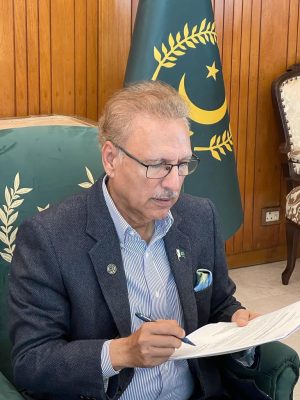A dangerous deadlock persists between the Pakistani government and the Pakistan Tehreek-e-Insaf (PTI)-led opposition over the fate of elections for the Punjab and Khyber Pakhtunkhwa (KP) provincial assemblies.
Earlier this month, the Supreme Court, in a case relating to the delay in holding elections, ruled that polls in both provinces should ideally be held within 90 days of the dissolution of the assemblies. Last week, President Arif Alvi, a PTI stalwart, unilaterally announced that elections for the dissolved Punjab assembly would be held on April 30. On Monday, Khyber-Pakhtunkhwa Governor Ghulam invited the Election Commission of Pakistan (ECP) for consultation, saying he would issue a date for polls after deliberation with the commission.
It does seem that the ruling Pakistan Democratic Movement (PDM) coalition is not happy with Alvi’s announcement and the Supreme Court’s election directives. On Sunday, PDM President Maulana Fazlur Rehman rejected the apex court decision saying that the government was being asked to hold polls in 90 days although the “same Supreme Court had given Gen. Pervez Musharraf three years to hold polls.”
“Sometimes, in the eyes of the Supreme Court, holding polls in three years is a constitutional requirement and sometimes it gives authority to an individual to make amendments to the Constitution,” the PDM chief said. Rehman added that a decision in this regard would be made by the government after reviewing all relevant aspects, including the “law and order situation, weak national exchequer and price hike.”
Meanwhile, Pakistan’s Interior Minister Rana Sanaullah whose party, the Pakistan Muslim League-Nawaz (PML-N), is a major stakeholder in the government, has said that “elections should be held to bring stability, not to start a new crisis.”
These statements indicate that the PDM is strongly opposed to the holding of elections at this juncture, and it’s possible the parties in power may not participate in the polls if they go ahead as announced.
“If the institutions, the ECP, and other responsible people believe holding elections is necessary they will do it, and if they think after May 1 another issue can start, then it’s possible they may postpone it,” the interior minister said.
It appears that the government is not going to hold elections despite the court’s orders. The Ministry of Defense recently said it could not provide security for the Punjab and Khyber Pakhtunkhwa elections.
The ECP may not get the necessary funds to conduct elections, meaning the electoral watchdog is likely to go back to the top court in the coming days.
Politicizing the election process ahead of the polls indicates a serious trust deficit among political stakeholders. Moreover, the ongoing controversy over the issue shows that political parties have failed to resolve the issues amicably by using constitutional and legislative mechanisms.
This is happening because key players are not ready to sit together for talks as their egos have grown bigger than the country’s national interests. Political leaders, including former Prime Ministers Imran Khan and Nawaz Sharif of the PTI and PML-N, respectively, have seemingly forgotten that politics is meant to serve the people and not politicians.
For instance, the PTI’s entire political campaign is built upon delegitimizing the ruling coalition and maligning institutions as facilitators of corrupt practices. On the other hand, the parties in power feel that they were victimized when they were in opposition and fear the same treatment again. Above all, the PDM leadership believes that they have lost their political capital largely because they have been trying to fix the mistakes made by the PTI during its rule. Thus, if they go into elections under these circumstances, they stand to lose.
Clearly, with inflation out of control and the economy facing collapse, there is no love lost for the current ruling coalition among the people. Therefore, it is reluctant to hold elections until the political environment suits its electoral prospects.
At this stage, it is unclear what sort of role the new army leadership is ready to play to resolve the crisis. So far, Army Chief Lt. Gen. Asim Munir has not tried to bring the political stakeholders together to reach a consensus over the issue of elections. However, it seems that with political leaders constantly at each other’s throats, he may have to mediate to restore a semblance of stability and order.
Pakistan’s political parties need to develop some sort of consensus before going to the polls. The country cannot afford another controversial election, which could start a new era of instability.

































